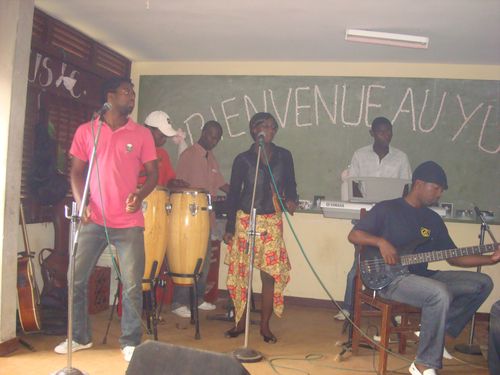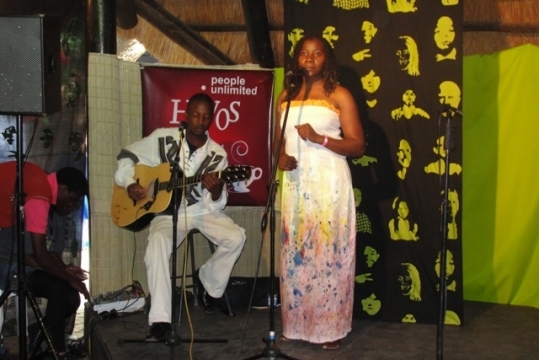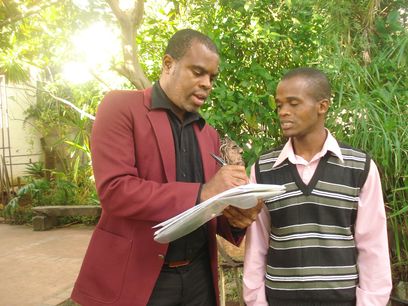|
09Jun
Zimbabwe’s Afro-jazz goddess charms fans
News / Latest / Ernest Kanjo
Wednesday, 09 June 2010 00:00
|

Zimbabwe's Afro-jazz goddess charms fans
Written by Ernest Kanjo
Doing back-up for Zimbabwe's leading jazz singer, Oliver Mtukudzi is undoutedly every young musicians' dream in that country. Ask her, Dudu won't waste a moment in telling you it is the best thing that ever happened to her career. In Bulawayo, the country's second biggest city where Mtukudzi is quite loved, Dudu is an illustrous daughter.
It is here that Dudu, today, Zimbabwe's most popular female Afro-jazz fusion artiste was born 29 years ago. Clearly, Bulawayo knew the little girl was destined for music, since the art ran in her family. But little did the talented ebony singer guess hers was going to be a huge success story until she hit the mark.
In Zimbabwe today, the mention of Dudu brings warmth to thousands of hearts. ''This is thanks, not only to my soul-searching voice, but also because of the human-related themes and the women's agenda I have pushed forth,'' she told TIPTOPSTARS after a brilliant performance at HIFA 2010.
With three albums circulating, Dudu champions the course of disadvantaged citizens, but at the same time drives down passionate emotions of sweet melodious beats in an irresistible manner. Such ingenuity has not gone unnoticed by welfare organisations and music researchers, who have seen in the 1.75m-tall artiste, resourcefulness.
The first privileged encounter came in early 2009 when Dudu was invited to feature in an ActionAIDS-sponsored African album, geared at combating hunger. ''I found that a great honour, coming together with other colleagues to support such a course,'' she said. ''Fight Against Hunger'' was going to open more doors for the Bulawayo girl, married to a nice husband, as she describes him.
A couple of months after, Norwegian exchange music teacher, Cecilie Giskemo could not hide her feelings anymore and without hesitation, broke the idea of a collaboration between a female vocal group in her country and a mainstream of Zimbabwean female artistes. Six months of working together yielded what has been described as a beautiful blend of dance and music that embraces jazz, African traditional, Norwegian folk, improvisation and the notion of womanhood.
At WoCalling's (as the project is called) maiden outing that happened during HIFA 2010, guests to Harare now understood why Dudu had been on every lip since they came to town. The charming vocalist, who stood out, thrilled hundreds, attracting thunderous applause. After HIFA 2010, Dudu has become even more popular. ''My latest album has been doing pretty well and many more people have fallen in love with the songs.''
When she thinks of her success story, Dudu always wants to look back at her school days when she sang in the College choir. ''I would stay back after classes for rehearsals and thereafter, dash to meet some older boys with whom we practised singing,'' the artiste recalled. ''That is how I got spotted by a music teacher who raised me professionally.'
But as she grew up singing, the Harare-based jazz icon nursed admiration for South Africa's Miriam Makeba aka Mama Africa and Zimbabwe's Dorothy Masuka. If her progress is anything to go by, then Dudu is up for the kind of strides her role models made. Then, that would not only be glory for Zimbabwe, but a source of pride for the entire continent.
|
|
Last Updated on Wednesday, 09 June 2010 14:44 |
|
07Jun
Yaounde University band booms
News / Latest / by Ernest Kanjo & Efeti Moka
Monday, 07 June 2010 13:11
|
 If you are living in Yaounde, capital of Cameroon and want to get a feel of talent, go to the University of Yaounde I on Saturday afternoons. Follow the direction to where some beautiful sound is coming. Before you know it, you are in the small room that harbours YUM, the famous Yaounde University Music Club. Then, it may become difficult to leave until the rehearsals are over. Why? The answer is simple! YUM is spectacular. If you are living in Yaounde, capital of Cameroon and want to get a feel of talent, go to the University of Yaounde I on Saturday afternoons. Follow the direction to where some beautiful sound is coming. Before you know it, you are in the small room that harbours YUM, the famous Yaounde University Music Club. Then, it may become difficult to leave until the rehearsals are over. Why? The answer is simple! YUM is spectacular.
Created in 1970, YUM is the oldest club on the UNIYAO I campus after UNESCO. It is made up of young prospective musicians with the aim of promoting the Cameroonian culture in the university milieu. The 87 members who make up YUM today meet every Wednesday, Friday and Saturday to train and sharpen their skills in singing and playing instruments. And, they do it so well, thanks to the ingenuity of young guitarists, pianists, percussionists and singers.
Apart from the annual University Games, YUM has performed at several events including the 2007 International Business Fair for Students and the 2008 National Festival of Arts and Culture (FENAC) in Maroua. The orchestra also performs at weddings and anniversaries.
But why can't YUM put an album in the market? "We would do that if we had adequate financial means," said a member of the band. Mouelle further told us some time ago that YUM receives little or no financial support from the university but would not forget the former Rector, Dorothy Njeuma's largesse who provided the orchestra with instruments. He however said YUM receives an annual subvention of 100,000FCFA from the Ministry of Higher Education which is grossly insufficient.
Fortunately, the lack of money has not distorted the beautiful sounds of their voices nor instruments. They still put up a wonderful show that makes YUM products, proud of now renowned musicians such as: Ateh Bazore, Donny Elwood, Majoie Ayi and the SG at the Cameroon Prime Minister's office, Jules Doret Ndongo.
|
|
07Jun
When music pirates sing better
News / Latest / Ernest Kanjo
Monday, 07 June 2010 12:51
|
 When problems last for just a while because they are solved, little is said about them. But when they stretch endlessly, it means solutions have become far-fetched. That seems to be the case with music piracy in Cameroon, today an unbearable canker. When problems last for just a while because they are solved, little is said about them. But when they stretch endlessly, it means solutions have become far-fetched. That seems to be the case with music piracy in Cameroon, today an unbearable canker.
Within the last 10 years, the illegal duplication and sale of CDs has characterised the landscape in one of Africa's music destinations - Cameroon. Original CDs, usually marked by high quality sound and colourfully attractive jacketing have almost finally given way to appallingly bad ones, fabricated under very unorthodox conditions.
Not only are these contraband products, unprofessionally manufactured, distasteful to the ears, they are reported to be the root cause of the breakdown of musical sets. Usually, an MP3 would harbour the compilation of all the works of given musicians, with jacket listings that diametrically oppose what is recorded on the CD. Sometimes, the face on the jacket has nothing to do with the songs in the CD.
Yet, the fake is what has flooded the Cameroonian music market and its authors have continuously made brisk business to the detriment of producers, singers and professional distributors. Many of the pirates whom musicians accused being heartless competitors, hardly contribute anything to music production, but are the first to jump at any new product and give it the widest publicity for their own interest alone. Some have even put songs on the market before their release.
Thus, when original CDs sell at 1.500FCFA (3.75 Dollars) to 2.000FCFA (5 Dollars), pirated versions go for as cheap as 3.00FCFA (0.75 Dollars). Some pirated music consumers confess they have bought CDs at 2.50FCFA (0.62 Dollars) and even less.
It has been literally understood in Cameroon that music comsumers go for pitrated CDs because of a weak purchasing power, resulting from the dreaded economic crisis plaguing most countries for long now. Others complain that they are unable to lay hands on original CDs any more. Music sponsors say they would rather run just a few original copies for buyers who can afford than embark on wasteful mass production. But, the fact remains - musicians, the hitherto crowd pullers, and once considered demi-gods have gone bankrupt and reduced to beggars. While some seek solace in the Diaspora, others have disappeared from the music scene and opted for careers in completely different disciplines.
The alarming nature of the crime (punishable by the Cameroonian law) has necessitated several attempts at combating music piracy. But the more frantic efforts are made, the more solid it has become. Acknowledging their might was not mighty enough to fight pirates, music stakeholders sought for Government intervention. Feedback was not only delayed, but turned out negative when it dawned (rightly or wrongly) on them that the piracy network was ironically manned by some big wigs in policy-making positions.
A former Board Chair of Cameroon Music Corporation, CMC (now replaced by another body) would walk along the streets of Yaounde and Douala, the country's two main cities, cease and burn piracted CDs, with the aid of the police, only to find more the next day.
Even when they thought the creation of an anti-pirate body made up musicians, Comite Musicale de Lutte Contre la Piraterie (in French) was going to be the lasting solution, it soon became public knowledge that some singers themselves were deeply invloved in the crime.
Many questions have since lingered around - if the powers that be and musicians themselves are accomplices, how and when will the crime be tackled? When do Cameroonian musicians start making a livelihood from their works once again?
|
|
02May
“Taxi conversations inspire my poetry”
News / Latest / Ernest Kanjo
Sunday, 02 May 2010 22:03
|
 -Batsirai Chigama, Zimbabwean performance poet -Batsirai Chigama, Zimbabwean performance poet
Zimbabweans may have little interest in written poetry because of a general lackluster reading attitude. But, for some time now, there has been a silver lining to this problem - oral poetry. With the proliferation of performance poets in the country, many more people now find time and space in their hearts for poetry. This has been thanks to the incredible talent, displayed by some of the country's performance poetess, among them, Batsirai Chigama. At one of the Harare International Festival of Arts (HIFA) poetry cafés, the young poet from Murehwa, gave spectators a reason for their entry tickets. TIPTOPSTARS' Ernest Kanjo caught up with Chigama soon after the show. Excerpts.
After such a wonderful performance, do you think your day has been fulfilled?
Certainly! Each time I perform and received such positive feedback, I go home feeling really proud of myself.
For how long have you been doing poetry?
Four years. I started way back in 2006.
What motivated you into poetry?
For me, it is the most appropriate means to vehicle a message across. I think I have a lot to tell the world and need such a forum to express myself.
How do you get inspired?
I gain inspiration from everyday experiences. It could a conversation in a taxi cab, a book I read or other happenings in the society.
How many poems do you have to your credit?
I have written more that 200 and performed quite many. I have published 96 in a collection. Some of my poems which are not available in Zimbabwe have been published in the UK.
Have you ever been reprimanded for performing critical poems?
No. We got real freedom of expression.
As a woman how do you find the task?
Quite easy for me! Many girls are getting inspired by what I do and are coming on board. I have always encouraged them to join the few of us who are in the art.
Which is the poem you will always be caught performing?
Braille, The Art of Feeling is my favourite piece. It is so inspiring to me and talks about a way of expressing oneself when one faces certain challenges.
What else does Chigama do apart from poetry?
I do gender project writing for a civil society organization, based in Harare.
|
|
|

 Well, I think the CEA was a very shallow and misgu... More...
Well, I think the CEA was a very shallow and misgu... More... This is creativity we are talking about, this are ... More...
This is creativity we are talking about, this are ... More... Lovelyn,your pre-selection criterias are ok but i'... More...
Lovelyn,your pre-selection criterias are ok but i'... More... camhood 4 the better More...
camhood 4 the better More... fame is gd More...
fame is gd More... CONGRATULATION. THANK GOD FOR YOU GUYS. CAMEROON S... More...
CONGRATULATION. THANK GOD FOR YOU GUYS. CAMEROON S... More... cool girls dat was great but this year we the cons... More...
cool girls dat was great but this year we the cons... More... The News
The News ''
''
 If you are living in Yaounde, capital of Cameroon and want to get a feel of talent, go to the University of Yaounde I on Saturday afternoons. Follow the direction to where some beautiful sound is coming. Before you know it, you are in the small room that harbours YUM, the famous Yaounde University Music Club. Then, it may become difficult to leave until the rehearsals are over. Why? The answer is simple! YUM is spectacular.
If you are living in Yaounde, capital of Cameroon and want to get a feel of talent, go to the University of Yaounde I on Saturday afternoons. Follow the direction to where some beautiful sound is coming. Before you know it, you are in the small room that harbours YUM, the famous Yaounde University Music Club. Then, it may become difficult to leave until the rehearsals are over. Why? The answer is simple! YUM is spectacular. When problems last for just a while because they are solved, little is said about them. But when they stretch endlessly, it means solutions have become far-fetched. That seems to be the case with music piracy in Cameroon, today an unbearable canker.
When problems last for just a while because they are solved, little is said about them. But when they stretch endlessly, it means solutions have become far-fetched. That seems to be the case with music piracy in Cameroon, today an unbearable canker.  -Batsirai Chigama, Zimbabwean performance poet
-Batsirai Chigama, Zimbabwean performance poet